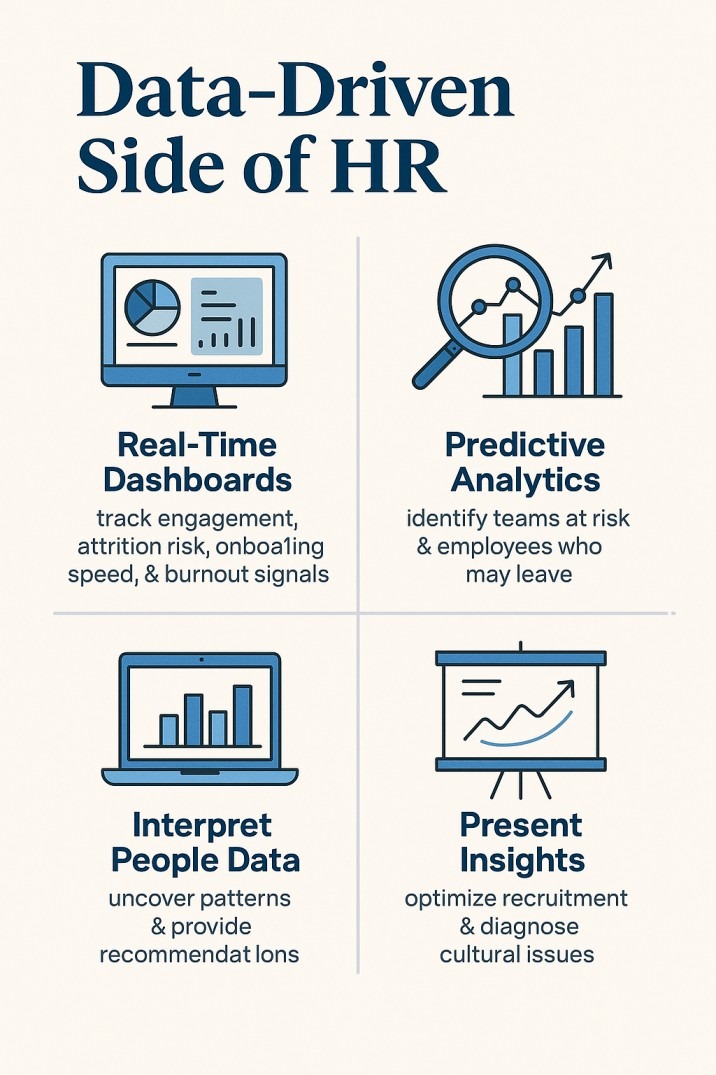Choosing a career is no longer about finding a safe path—it’s about finding one that’s adaptable, impactful, and fulfilling. Human Resources, once viewed as a back-office administrative function, has been transformed by digital disruption, evolving employee expectations, and global talent challenges. The question on many aspiring professionals’ minds is: is human resources a good career in 2025?
To answer that, we must look beyond job descriptions and salaries. We need to understand the full scope of HR today, the trends shaping the field, the challenges it faces, and the opportunities it presents. Whether you’re fresh out of university, considering a career change, or already in the field and questioning your next move, this exploration of HR in 2025 is designed to give you clarity.
Human Resources: The Function Has Evolved
There was a time when Human Resources meant handling resumes, conducting exit interviews, and cutting checks on payday. That era is long gone. In 2025, Human Resources has evolved into something far more influential and multifaceted. It is no longer a back-office function—it’s a strategic force embedded at the very core of every thriving organization.
From fostering workplace innovation to safeguarding against compliance risks, today’s HR leaders are business drivers, not just policy enforcers. In a world marked by remote work, AI disruption, and ever-changing labor laws, the function of HR is not just necessary—it’s essential.
HR’s Strategic Role in Business Growth
In 2025, companies no longer view HR as a cost center. Instead, it’s seen as a value-generating entity that ensures the workforce is aligned with long-term goals. The modern HR team influences decisions that directly affect profitability, such as talent retention, performance management, and leadership development.
And when asking what does a human resource manager do?, the answer begins with strategy. HR managers are now involved in executive discussions about workforce planning, DEI initiatives, and cross-border labor compliance. They help shape policies that ensure a resilient, future-proof workforce.
Culture Architects and Change Agents
Culture is no longer a buzzword—it’s a competitive advantage. And HR is its chief architect.
Today’s HR professionals build workplace cultures that foster innovation, respect, and trust. This includes nurturing psychological safety, crafting inclusive environments, and supporting mental wellness. If you’re wondering what does a human resource manager do?, one key responsibility is being the cultural compass of the organization. Whether it’s navigating mergers or managing generational shifts in values, HR leads the way.
Moreover, in companies navigating rapid growth or digital transformation, HR is the stabilizing force that enables change. They craft communication plans, train middle management, and facilitate transitions—all while ensuring that morale doesn’t slip.
Mastering the Hybrid Workforce
Remote and hybrid models have redefined what it means to “go to work.” HR departments now manage employees across multiple time zones, cultures, and even legal frameworks. This requires advanced coordination, tech fluency, and empathy.
So again, what does a human resource manager do? They’re now also tech strategists—selecting collaboration platforms, defining hybrid policies, and designing equitable engagement strategies for both in-office and remote staff.
Managing fairness, inclusion, and productivity in a hybrid model isn’t easy—but it’s become one of HR’s most mission-critical tasks.
The Data-Driven Side of HR

Emotions and empathy matter in HR—but so does data. Today, Human Resources teams use real-time dashboards to track engagement, attrition risk, onboarding speed, and even burnout signals. Predictive analytics help identify which teams might fracture and which employees are at risk of leaving.
Asking what does a human resource manager do? must now include their role as an analyst. These professionals need to interpret people data, uncover patterns, and present evidence-based recommendations to C-level leaders. Whether it’s optimizing recruitment funnels or diagnosing cultural pain points, HR is now as numbers-driven as the finance team.
Compliance Meets Innovation
From GDPR and DEI mandates to local labor laws and emerging AI ethics, compliance today is a moving target. HR is responsible for meeting these legal obligations without slowing down innovation or employee experience.
When considering what does a human resource manager do?, don’t forget their legal hat. They oversee everything from whistleblower systems to AI bias audits and digital surveillance ethics. Balancing employee rights with business objectives requires not only legal knowledge but moral clarity.
The HR manager has become a translator between legal frameworks and human behavior. It’s a role that sits at the intersection of law, ethics, and operational agility.
Emotional Intelligence and Digital Fluency: Non-Negotiables
Soft skills are now hard requirements.
In the modern workplace, HR must manage conflicts, defuse toxic dynamics, and guide leaders toward more compassionate management styles. Emotional intelligence isn’t just a nice-to-have; it’s a core competency.
At the same time, digital fluency is just as critical. The tools HR manages—from applicant tracking systems to virtual reality onboarding—require constant learning. So when asking again what does a human resource manager do?, the short answer is: they adapt, constantly. They stay ahead of HR tech trends while remaining deeply human in their approach.
The Career Perspective: Is It the Right Path for You?
Human Resources today is not a fallback career—it’s a calling. It attracts individuals who are curious about human behavior, excited by innovation, and comfortable with ambiguity.
HR roles aren’t only about helping others—they’re about shaping the future of work. And that future demands high-level thinking, business literacy, emotional intelligence, and the ability to evolve.
So if you’re still wondering, what does a human resource manager do?, just remember: they influence culture, interpret data, manage crises, and shape strategies that touch every single person in an organization. They are, quite literally, the human edge in a digital era.
HR in the Age of AI and Automation
One major factor influencing whether human resources is a good career in 2025 is the rise of automation and artificial intelligence. Rather than replace HR professionals, AI tools are becoming strategic assistants. They handle repetitive tasks like resume screening, onboarding paperwork, and basic employee queries. This allows HR professionals to focus on the more human aspects—engagement, culture, leadership development, and conflict resolution.
This shift elevates the value of HR within organizations. When mundane tasks are automated, human resource specialists have more capacity to act as business partners and cultural architects. For those wondering is human resources a good career amid the AI wave, the answer depends on your ability to evolve. If you’re adaptable and tech-savvy, HR offers a future-proofed path rich with growth potential.
Talent Management is Now a Business Imperative

The talent war hasn’t ended; it’s simply shifted in shape. Remote work, gig economy trends, and global hiring have made workforce management more complex than ever. HR departments are tasked with not just recruiting top talent, but also keeping them engaged, productive, and loyal.
Retention strategies now include flexible benefits, career mapping, and mental wellness programs—all orchestrated by HR. That makes the question is human resources a good career incredibly relevant, especially for those drawn to roles that influence employee well-being and development.
In many ways, HR professionals are becoming internal consultants. They advise executives on how to retain talent, prevent burnout, and create inclusive environments. If you find fulfillment in helping others reach their potential while aligning people goals with business objectives, the human resources career path might be exactly what you’re looking for.
The Rise of Strategic HR Roles
The C-suite is no longer the exclusive domain of finance and operations. Chief Human Resources Officers (CHROs) now command a seat at the table. Their insights are crucial to mergers, acquisitions, international expansion, and crisis management. This is no accident—companies have realized that culture, retention, and productivity are all anchored in HR strategy.
So, is human resources a good career for someone with executive ambitions? Yes—because the modern HR ladder doesn’t stop at middle management. It leads to the boardroom, offering ambitious professionals a path toward strategic leadership.
But this trajectory isn’t handed out easily. You need to combine a deep understanding of human behavior with operational insight, data literacy, and a forward-thinking mindset. If that challenge excites you, HR in 2025 is a fertile ground for your growth.
Compensation and Career Stability
Let’s talk numbers. According to 2024 labor statistics across the US, the average salary for HR specialists is steadily rising, with roles in talent acquisition, employee relations, and HR analytics seeing particularly high demand. Senior HR professionals can earn six-figure salaries, especially in major cities or in companies with complex global operations.
That’s part of why people often ask, is human resources a good career financially? While it may not match the starting salaries of tech or finance, HR offers consistent growth, strong benefits, and impressive job stability. During economic downturns, companies still need HR to manage layoffs, morale, and regulatory compliance. In boom times, HR becomes vital for scaling teams, developing leadership pipelines, and maintaining culture during hypergrowth.
In short, the financial outlook is solid, especially for those who continuously upskill and specialize in areas like DEI, HR tech, or labor law.
Educational Pathways and Professional Development
One of the reasons people continue to ask, is human resources a good career, lies in its accessibility. The field doesn’t demand a single rigid educational path, which makes it uniquely inclusive. While many HR professionals emerge from traditional business schools with concentrations in Human Resources Management, others pivot into the field through psychology, sociology, or even law. This diversity of origin stories enriches the profession, allowing it to benefit from a wide range of perspectives and skill sets.
Whether you’re trained in behavioral science or employment law, your expertise can add value to modern HR teams that are increasingly multidisciplinary. HR today isn’t just about filling out paperwork—it’s about understanding people, interpreting data, and influencing corporate strategy.
Certification: Building Credibility in a Competitive Market
As the field grows more sophisticated, so do the expectations placed on HR professionals. That’s where globally recognized certifications come in. Designations such as SHRM-CP (Society for Human Resource Management Certified Professional), HRCI-PHR (Professional in Human Resources), and CIPD (Chartered Institute of Personnel and Development) serve as professional milestones.
These certifications don’t just signal expertise—they give candidates a competitive edge when exploring how to get a job in human resources. Recruiters and hiring managers increasingly look for these designations as signs of commitment, credibility, and proficiency. And the good news? You don’t need a master’s degree to start collecting them. Many of these programs are accessible to individuals with relevant experience and a desire to grow.
Lifelong Learning: The DNA of HR in 2025
The human resources landscape in 2025 is anything but static. Regulatory frameworks are evolving rapidly. Automation tools and artificial intelligence are reshaping how companies hire, onboard, and engage talent. To stay relevant, HR professionals must adopt a growth mindset. That means reading whitepapers, attending webinars, getting recertified, and staying curious.
If you’re researching how to get a job in human resources, understand that it’s not just about landing the position—it’s about sustaining a meaningful career through continuous development. In fact, the professionals who will rise to leadership roles are those who anticipate change and adapt quickly. They see every new labor law, DEI initiative, or tech rollout as a chance to learn—not as a burden.
Flexibility Meets Professional Momentum
Unlike many rigidly tiered career paths, HR offers vertical and lateral mobility. You might start as a recruiter and transition to a learning and development specialist. You could begin as a compensation analyst and evolve into an employee experience leader. The versatility of roles ensures that you’re never trapped in a monotonous loop.
This flexibility also informs the journey of how to get a job in human resources from scratch. Some start as HR coordinators in small firms and grow into directors at multinational corporations. Others leverage transferable skills—like empathy, organization, or conflict resolution—from unrelated industries and find their footing in HR roles designed for those exact competencies.
Digital Literacy: The New HR Prerequisite
In 2025, knowing Excel isn’t enough. Today’s HR tech ecosystem includes AI-powered recruitment tools, people analytics dashboards, workforce planning software, and remote onboarding solutions. If you want to understand how to get a job in human resources, you need to become digitally fluent.
Digital literacy is now a baseline expectation, not an optional bonus. From managing HRIS platforms to analyzing attrition trends, tech skills are increasingly central to every role—from assistant to VP. Fortunately, you don’t need to be a software engineer to succeed. Free platforms, short courses, and microcredentials can teach you tools like Workday, BambooHR, or Tableau, and immediately elevate your job-readiness.
How to Get a Job in Human Resources: A Personal Growth Blueprint
The real secret behind how to get a job in human resources lies in alignment. Ask yourself: Are you people-centered? Do you enjoy solving problems without perfect answers? Are you willing to keep learning even when you feel comfortable? If so, HR isn’t just a career—it’s a calling.
Mentorship, networking, and strategic internships can all support your entry, but your attitude is the ultimate lever. Employers aren’t just hiring skill sets anymore—they’re hiring learners. People who can decode the future of work. Professionals who can balance empathy with analytics.
If you’re exploring how to get a job in human resources as a long-term investment, you’re on the right track. It’s not just about securing employment. It’s about stepping into a role where you shape cultures, protect well-being, and influence how companies treat their most valuable asset—people.
So, when someone asks is human resources a good career, the evidence stacks up on the affirmative side. It’s a field built on adaptability, empowered by knowledge, and constantly enriched by human complexity. If you’re still asking how to get a job in human resources, then know this: curiosity, adaptability, and compassion are your best starting points.
Emotional Intelligence: The Unsung Skill
Not every field values emotional intelligence the way HR does. In fact, EQ is at the core of what makes HR professionals successful. It allows them to de-escalate conflicts, coach leaders, facilitate difficult conversations, and build trust across all levels of the organization.
This makes HR ideal for empathetic professionals who want to make a tangible impact. If you’ve ever felt torn between a people-centric calling and a desire for corporate structure, HR might be your ideal hybrid. So, is human resources a good career for the emotionally intelligent? Undoubtedly. It’s one of the few roles where compassion is considered a strategic advantage.
Challenges You Shouldn’t Ignore
Of course, no career is without drawbacks. HR professionals often navigate difficult situations—disciplinary actions, layoffs, legal conflicts, and employee grievances. The emotional toll of such responsibilities can be intense. Additionally, HR often acts as the middle layer between management and staff, which sometimes puts it in politically tricky terrain.
This leads some to ask: is human resources a good career if you’re conflict-averse? The answer is: maybe not. It’s a career for those who can remain objective under pressure, mediate disputes, and balance empathy with organizational goals. But for those who can master that balance, the rewards—both personal and professional—can be substantial.
Remote Work and Global HR

Another major shift is the globalization of teams. HR departments now manage workers across time zones, languages, and cultures. This requires mastery of global labor laws, international payroll systems, and digital collaboration tools.
So when evaluating is human resources a good career, consider whether you’re excited by the idea of cross-cultural communication and managing complexity. If so, HR in 2025 is more global, more flexible, and more remote-friendly than ever.
Many professionals today are drawn to remote-first roles, and HR fits well within this framework—especially in functions like recruitment, L&D, and HRIS (Human Resources Information Systems). That flexibility has made the field more attractive to working parents, digital nomads, and career changers alike.
Final Words
After exploring the multifaceted landscape of HR today, the answer to the question is human resources a good career in 2025 becomes clear: yes, if you are prepared to evolve with the field. It is a career grounded in empathy, elevated by strategy, and fueled by data. It’s not for the passive or the faint-hearted. It requires critical thinking, ethical fortitude, and constant learning.
But it’s also one of the few careers where you can influence every part of an organization—from its hiring policies to its leadership development, from its DEI goals to its crisis response plans. That kind of reach is rare.
So, if you’re asking yourself is human resources a good career, don’t just look at salary ranges or job postings. Ask yourself this: Do I want to build workplaces that thrive? Do I want to help people grow, resolve conflicts, and lead with clarity? Do I see myself influencing not just what people do, but how they feel at work?
If the answer is yes, then welcome. HR in 2025 is not just a good career. It might be one of the most important ones.
Andrea Balint is a writer and researcher focused on human behavior, workplace psychology, and personal growth. Through her work at CareersMomentum, she explores how mindset, leadership, and emotional intelligence shape modern careers. With a background in communication and HR development, she transforms complex ideas into practical insights that help readers build clarity, confidence, and professional purpose.
